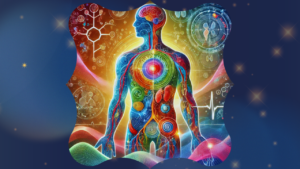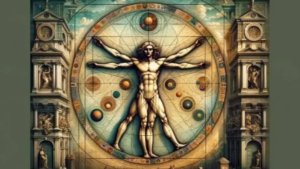Stress is not a rigid, inescapable condition – it is a label, a construct we have collectively accepted without scrutiny. But is stress truly dictated by external pressures, or is it a product of our response to them? The philosopher Epicurus once said, “You don’t develop courage by being happy in your relationships every day. You develop it by surviving difficult times and challenging adversity.” Stress, then, is not the enemy – it is a signal, a summons to adapt, evolve, and grow.
The Binary Nature of Stress: Positive & Negative Stress
There is no progress without stress. Adversity is often the mother of innovation, as they say, and it is entirely up to us whether we view the glass as half full or half empty. The crucial question, then, is do we experience stress as an oppressive force, or do we respond with intention, using it as a stepping stone for development and growth?
Unfortunately, in our modern culture, stress is all too often assigned a negative label by default. Stress, in and of itself, is neutral; our perception is what defines its impact. When faced with an upcoming event, deadline, or exam, for example, ‘stress’ can either fuel our drive and passion to succeed more, or it can paralyse and disrupt us.
From this perspective, we can utilise stress to either strengthen us – making us more resourceful and fulfilled – or allow it to overwhelm us. The choice, to act impulsively and allow stress to consume us; or to view it as a moment of learning and a demand for adaptation, is always ours. VHE advocates for a shift in perspective – one that transforms stress into a tool for expansion rather than a gateway to destruction and disease.
Choosing to Respond or React
At Vibrant Health Education (VHE), we challenge the conventional narrative, reframing stress as a proportunity – a precursor to an upcoming opportunity. Seen through this lens, stress becomes an instrument for resilience, adaptability, and strength rather than a force of depletion. Both consciously and subconsciously, if we internalise stress with thoughts of “Why me?” or excessive worry, we unconsciously convert emotional energy into physiological symptoms. When we react to challenges, having framed them as insurmountable threats, we thereby allow negative stress to dominate our physiology to our detriment. However, when we choose emotional autonomy and respond by perceiving it as a demand for adaptation, asking the right questions, then progress is inevitable.
Our emotions, as we explore in VHE’s curriculum, are energy-in-motion – and like all energy, they too cannot be destroyed, only transformed. Therefore, our emotions too convert into various forms, and similar to a battery, they can be positively or negatively charged.
The Psychosomatic Impact of Stress on Health
Stress is not just psychological – it is deeply physiological.
And so the psychosomatic impact, again, a binary one – will not only lead the psychological aspects of the individual but also the physicality of the body.
When left unprocessed, emotions store in the body, manifesting as tension, muscular spasms, or deeper systemic dysfunctions. There is however, a hierarchy involved in these patterns of deterioration and dysfunction.
Like the common battery, stored ‘potential’ energy, i.e. unprocessed emotions convert into many forms, such as kinetic or thermal for example, where we may either explode into a violent rage – or we implode. When imploding, stored energy-in-motion will, by default, make a beeline to the musculo-connective fibres first. Always.
There is no part in the body – be it organ systems, organ, tissue, or cells – that is not surrounded, containing or connected to muscular or connective fibres (even the cytoskeleton within a cell, is made of connective fibres!). Since the musculo-connective system is the first line of defence against negatively unprocessed emotions – the varying forms of energy conversion in the body, in response to mismanaged stress, are countless.
Perhaps we can all resonate with a headache, lack of breath or palpitations before an important deadline or meeting? Such symptoms give example to the aforementioned muscle tension and spasmodic responses in the various systemic realms such as the nervous system, respiratory or cardiovascular system. It might hit differently individually – but mismanaged stress and unprocessed emotion – will most inevitably hit somewhere!
Because connective fibers are interwoven throughout the body, stress-induced tension affects countless physiological processes. When emotional energy stagnates and converts into muscular rigidity, it disrupts circulation, restricts lymphatic drainage, and impairs nutrient delivery at the cellular level.
This occurs when emotion, instead of being processed beneficially, transforms into stored energy within the musculoskeletal system, manifesting as spasms. These spasms create a compressive force on local blood vessels, nerves, tissues, organs, glands, etc., impinging their function. This interference leads to a myriad of dysfunctions – often labeled, somewhat casually, as “stress-related” symptoms.
Over time, this can manifest as functional disorders – such as digestive disturbances (IBS), cardiovascular irregularities (palpitations), and muscular discomfort (lactic acid accumulation). If sustained, this dysfunction cascades into chronic inflammation, accelerating the progression of dis-ease.
Why This Matters for VHE
At VHE, we emphasise the power of perception. By teaching children to redefine stress – not as an overwhelming force but as an essential part of growth – we equip them with the tools to navigate life with resilience. When students learn to interpret stress as an opportunity rather than a threat, they develop a mindset that fosters mental, physical and emotional wellbeing.
Just as society has mislearned the nature of stress, we have the ability to unlearn and redefine it in a way that serves us. As Epicurus suggested, stress is not defined by situations and people – but by our response to it.
And finally, if you are going to take anything away from this article, remember that stress can be a destructive force, or it can be a gateway to transformation. The choice is ultimately ours.
in Health,
#vhedu❤️




